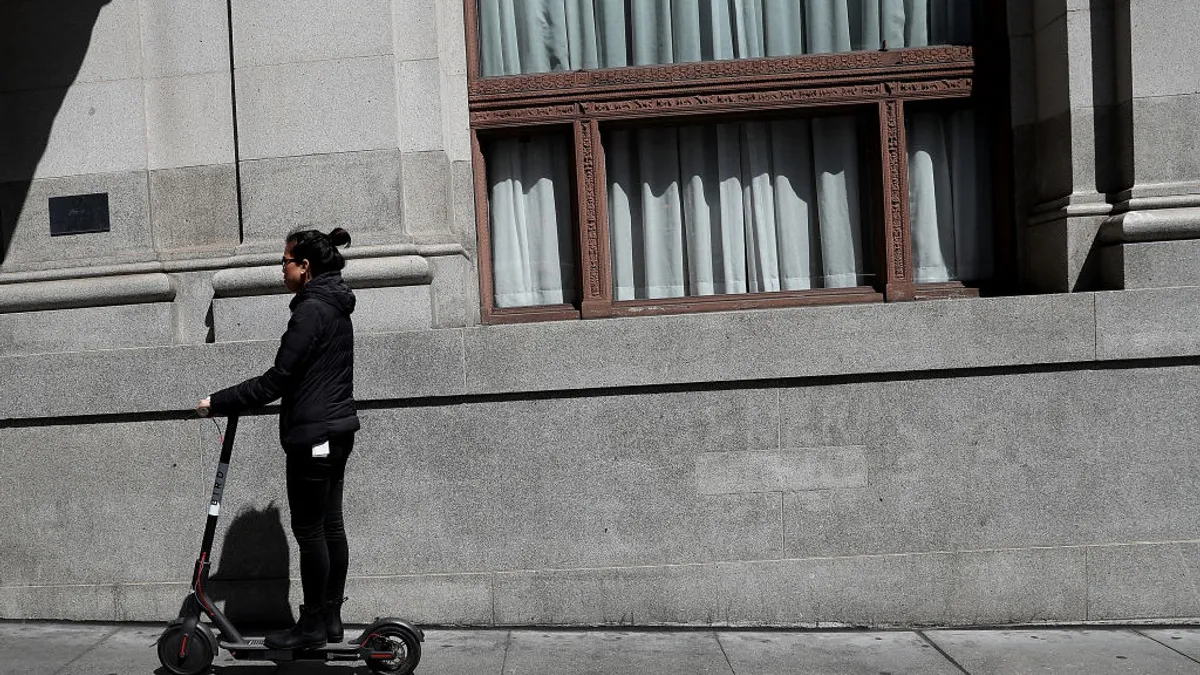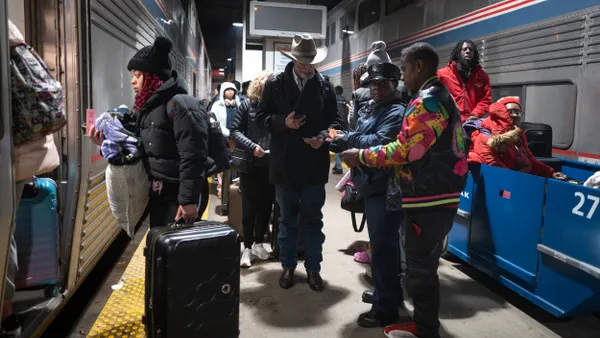Dive Brief:
- Pittsburgh is seeking to make universal basic mobility accessible to low-income residents through a new mobility-as-a-service (MaaS) platform that offers access to public transit and shared mobility services.
- Move PGH, designed by Transit App, will give users trip-planning and booking information from its partners — electric scooters from Spin, car-shares from Zipcar, electric mopeds from Scoobi, carpool services through Waze Carpool — as well as real-time bus and train information from TransitScreen. The platform will also support 50 new mobility hubs: locations that bring together multiple transportation options, including collections of shared vehicles.
- The city will offer monthly subscriptions, covered by grant funding, to Move PGH partner services for 100 low-income individuals for six months as part of a universal basic mobility pilot. The Manchester Citizens Corp., a local community development organization, will also provide "trip coaching" to ensure those individuals know how to use the provided services. "Access to transportation and mobility is the No. 1 way to improve someone’s economic stability," said Kim Lucas, assistant director of the Pittsburgh Department of Mobility and Infrastructure (DOMI). Move PGH will encourage "affordable, sustainable mobility" instead of private car ownership, Lucas added.
Dive Insight:
As new mobility options have flooded cities, private companies have sprung up to organize those options and give users various one-stop apps for trip planning. Companies like Uber and Lyft have tried to bundle services and transit information in their own platforms; other companies, like Transit and Cubic, have sought partnerships with cities and transit agencies. Some even integrate ticketing and payment information to handle cross-platform trips in one place.
Move PGH brings together a variety of private partners with DOMI and the city’s Port Authority, which controls public transit, for a city-led app with multiple transportation options, including e-scooters. Language in a recently passed state budget bill allows Pittsburgh to permit e-scooters, which had previously been illegal in Pennsylvania.
Regina Clewlow, CEO of transportation data firm Populus, which worked with Spin and DOMI on data sharing for the platform, said cities could learn a lot from the "open ecosystem" model that brought together multiple siloed data and management sources. By leveraging existing technology, Clewlow said, Pittsburgh can help "steer the outcome of the platform."
The platform will also support the creation and location of mobility hubs that will collect vehicles and place them in accessible, reliable locations for users, based on where the vehicles are most often used and picked up.
Karen Lightman, executive director of Metro21: Smart Cities Institute at Carnegie Mellon University, said the range of public and private partners in one place means that DOMI can incentivize safer and more sustainable mobility in line with the city's transportation goals.
"Spin couldn’t do this on its own, the Port Authority couldn’t do this on its own. This doesn’t happen without the public-private partnership," said Lightman, whose institute was involved in early discussions around the Move PGH platform. "So much of our infrastructure has been focused on cars … but this platform is focused on helping humans get around."
The MaaS platform is also a significant step in Pittsburgh’s push to achieve universal basic mobility, the idea that governments should offer an affordable, accessible baseline of transportation to all residents. According to the U.S. Bureau of Transportation Statistics, transportation was the second-largest expenditure for American households in 2019, trailing only housing when excluding certain spending on behalf of households, like health care benefits.
Reducing that expense, Lucas said, can create new employment and health care opportunities for low-income residents. The varied transportation options available through Move PGH and the interest in placing mobility hubs in low-income areas, she added, should encourage households to not rely exclusively on a costly private vehicle and instead explore how alternative options can be more convenient or sustainable.
"We want to make sure all trips are being done in the best way possible. You should be able to get fresh fruits and vegetables without having to drive a car," Lucas said.
Some transit agencies have also explored free or discounted fares for low-income residents, especially as the agencies recover from the COVID-19 pandemic. Lucas said the results of the six-month universal basic mobility pilot will guide future affordable mobility efforts, adding that there was little concern about discounted subscriptions reducing revenue.
"We hope to make a compelling case that when you’re able to help people make mobility gains, you improve their economic situation," Lucas said. "Maybe we can find resources to support that from places other than riders’ pockets."










